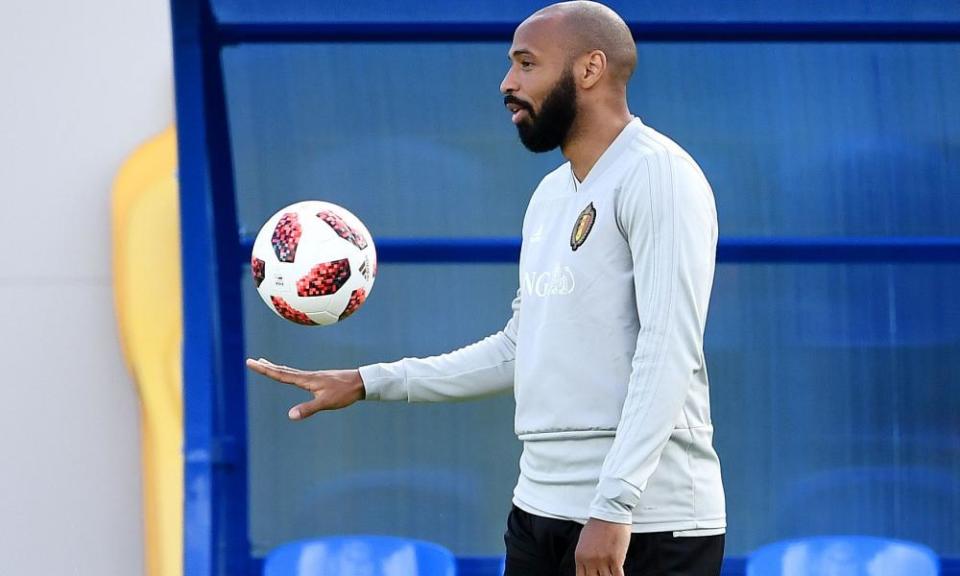Thierry Henry happy to stay in the shadows in Belgium’s cause

As Belgium began their World Cup preparations there was one coach who looked as if he was competing for a place in the starting XI. In the sprints he was up there with the best. During the warm-up exercises he barely lost the ball. You could see that he takes care of himself and his diet.
His name? Thierry Henry, of course. Such details enhance the former Arsenal forward’s status as an idol in the Belgium set-up and help to make him a perfect link between the players and staff.
But suddenly there are other links to consider, too. This week Henry has been thrust into the position of trying to help those players defeat the country of his birth, for whom he won 123 caps, not to mention a World Cup and European Championship.
READ MORE: France v Belgium: No goals, no problem as Giroud eyes glory
READ MORE: Brilliant Belgium knock Brazil out of World Cup
READ MORE: I proved again who I am – Courtois defiant after Belgium heroics
Henry’s presence on Belgium’s bench for their semi-final against France on Tuesday has prompted no shortage of comment from Les Bleus. “It’s bizarre,” Didier Deschamps, the coach, told Téléfoot. Olivier Giroud was more forthright. “I would be proud to show Titi that he chose the wrong camp,” he said. The striker believes it will be a “peculiar match” for Henry.
What Henry makes of it remains a mystery. Interview requests and demands to get him to a press conference were brushed aside. He prefers to leave the talking to the others. The 40-year-old does not want his massive shadow to take limelight away from those who have a bigger influence on performances.
No one in the Belgium camp carries a reputation as substantial as the former Arsenal striker’s. He is the most decorated staff member, with a Champions League and five league titles to add to those honours with France. He was – and still is – worshipped by millions of fans. He presents an image of charm, wit, intelligence and flair.
Even in Russia, 20 years after he won the World Cup, you can feel his aura. Journalists covering Belgium are starting to get slightly annoyed by it. At every press conference comes the same question. A Belgian, Dutchman, Frenchman, Spaniard or Englishman begs for the microphone and asks the player about … Belgium’s second assistant‑manager: “How does it feel to be on the pitch with him?” “What does he add to your game?” “Does his experience help you in the race to the final?”
Last week there were plenty of sighs among the reporters but now it is even worse. The Thierry Henry game is on. In the buildup to France‑Belgium the Belgium assistant will have most of the spotlights on him: the temporary enemy of France. His reputation, nationality and past drawn as a shadow over him, at a moment when he was enjoying a role in the shade.
Henry joined the Belgium squad in 2016, a few weeks after Roberto Martínez had been appointed as manager, and since has given one interview: to Belgium’s public broadcaster, in which he emphasised that he wanted to stay out of the limelight. “I am not the national manager, neither am I the assistant manager,” he said.
“I’m the T3, the third coach. From the beginning I have said that everybody had to keep calm. It’s not the Thierry Henry show; I’m here to help the manager and the squad. The manager is the one who will do the talking, I will try to make the team better. As a coach you don’t have to mention what you have done as player in the past. And as a coach I haven’t proven anything.”
I'm the third coach. I'm here to help the manager. It's not the Thierry Henry show
Thierry Henry
That was something he made clear to the Belgian football federation (KBVB) too, when an agreement was concluded in August 2016 in Monaco. In support of Martínez and his first assistant, the Englishman Graeme Jones, the governing body wanted a coach who had copious experience as a player, had won trophies and could transfer his know-how and winning mentality to this generation of players.
It was early in the process of searching out a successor for Marc Wilmots that Ralf Rangnick, now the director of football of RB Leipzig but then one of the three main candidates, mentioned that Henry was interested in joining Belgium.
Rangnick said that, if he got the job, Henry should join him as an assistant. Rangnick was not appointed but Martínez welcomed with open arms the suggestion of taking Henry on to his staff. KBVB directors have never hidden that Henry was getting work experience for his coaching badges. He was allowed to keep his well-paid job as a pundit with Sky and his demands were modest – he earns about €2,500 (£2,200) a week and apparently donates his wages to charity. Unlike Martínez, who signed a new two‑year deal before the World Cup, Henry has not accepted an offer to continue. The Belgian FA hopes he will extend, too.
When Henry was introduced to the players in their hotel in Zaventem in September 2016, some were amazed to meet him. He was one of their childhood idols. Some, such as Christian Benteke and Michy Batshuayi, had posters of him on the wall. A source in the KBVB said: “You should have seen their faces. Priceless reactions.” Batshuayi, master of social media, immediately posted a picture of Henry and him: “Learning from the best.”
Henry acts like a teacher, too. He regularly pulls the attackers aside to talk about their movement and positioning. At one of the first meetings he asked Eden Hazard, Romelu Lukaku and co to show clips and would give his observations. Henry, a perfectionist, does not mince his words. He can be very hard and forthright with the players. His little tricks help them. The younger squad members, in particular, listen to everything he says.
Lukaku was one of the first to knock on his door. They are similar characters and have a very natural relationship. “I have already told Thierry Henry that I have found out his technique to score goals,” Lukaku has said. “I’m not yet there, but I’m slowly getting there.”
Even in England they sometimes meet. “We discuss what I have to do better. I also talk him sometimes through some old games. One with Arsenal in the 2005-2006 season, for instance. I can tell you all about it, and then he brings out details from one of my matches, and together we look for ways in which I can do even better. I learn from him every day. The way of moving, how to find the spaces, control the ball as well as possible. He could do it all. I have learned so much from him.”
As a coach Henry is in the first place an observer. He takes care of the attacking set pieces but during the open group sessions he stays in the background. Others do the talking. Before each session he puts out the cones and at the end he removes them. Usually, while waiting for the players to leave the pitch, he does tricks with the ball. “I think that this is mainly school for him – these are his first years as a coach,” Dries Mertens has said.
Among the players Henry still likes to behave like one of the boys. He was seen playing basketball with Hazard and Benteke; he watches games with Vincent Kompany, who lifted him in the air after the Brazil game; he jokes around. “He is an idol for everyone within the group,” Youri Tielemans has said. “Someone who laughs very often and still has a boys’ mentality.”
But will he be laughing if he helps Belgium to slay France?


